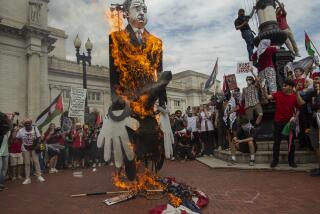In South Africa, thousands from all races march against President Jacob Zuma, but unity remains elusive
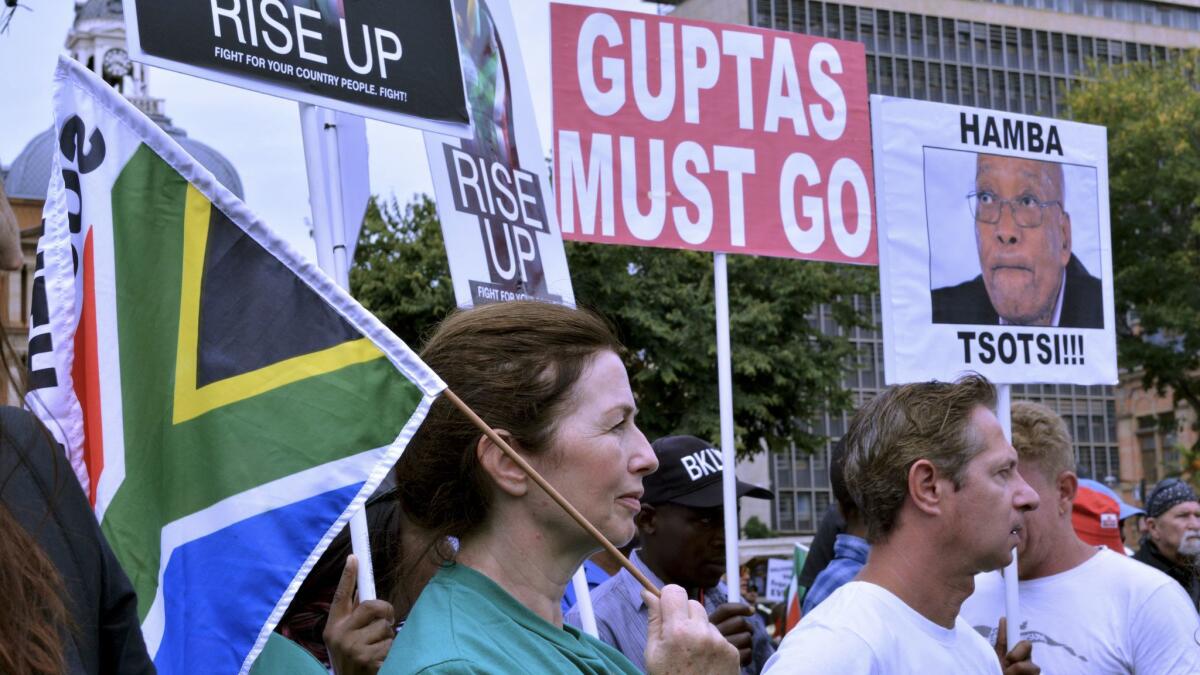
- Share via
Reporting from Johannesburg, South Africa — There was never going to be a march of a million people, but even before Friday’s protests in South Africa calling for President Jacob Zuma to resign, members of his party were deriding the demonstrations as the one-off roar of privileged white people.
The crowds that protested in the country’s main cities of Pretoria, Johannesburg and Cape Town did transcend South Africa’s ever-present racial divide, but not in the numbers likely to worry Zuma and the governing African National Congress. At most 20,000 people of all racial groups rallied in the two main cities, Pretoria and Johannesburg.
For many white South Africans, it was their first political protest — a fact that angered some black activists in one of the world’s most unequal countries.
“The last time white people came out in their numbers to protest against anything was when they were marching against democracy,” tweeted ANC supporter Thabiso Dlamini, with the handle Modern Day Pantsula, who also posted an apartheid-era photo of white demonstrators holding a banner that read, “Hang Mandela.”
The protests over Zuma’s dismissal last week of respected Finance Minister Pravin Gordhan came too late to make a political difference, according to analysts. The ANC’s National Working Committee closed ranks around Zuma on Wednesday, forcing prominent ANC members who had earlier criticized the president, including his deputy, Cyril Ramaphosa, to apologize.
With Zuma seen as likely politically safe until the end of his term, the marches still went ahead. A viral post, “Protest 101 for white people,” circulated on social media on the eve of the march.
“Friday’s protest is going to be horribly middle class,” it began, proffering ironic advice to protest newbies. “Wear sneakers and socks. You’ll need to move fast when the Nyalas arrive,” it said, referring to police anti-riot vehicles with water cannons. “Do NOT sing kumbaya,” it ran, adding that it was not de rigueur to quote the nation’s first black president, Nelson Mandela (loved by many ordinary South Africans but seen by radical political movements as a sellout), recommending instead Steve Biko, a black socialist detainee killed by apartheid police in 1977, or Che Guevara, the Argentine Marxist revolutionary.
“If you’re going to protest, make it about more than white discomfort,” it said.
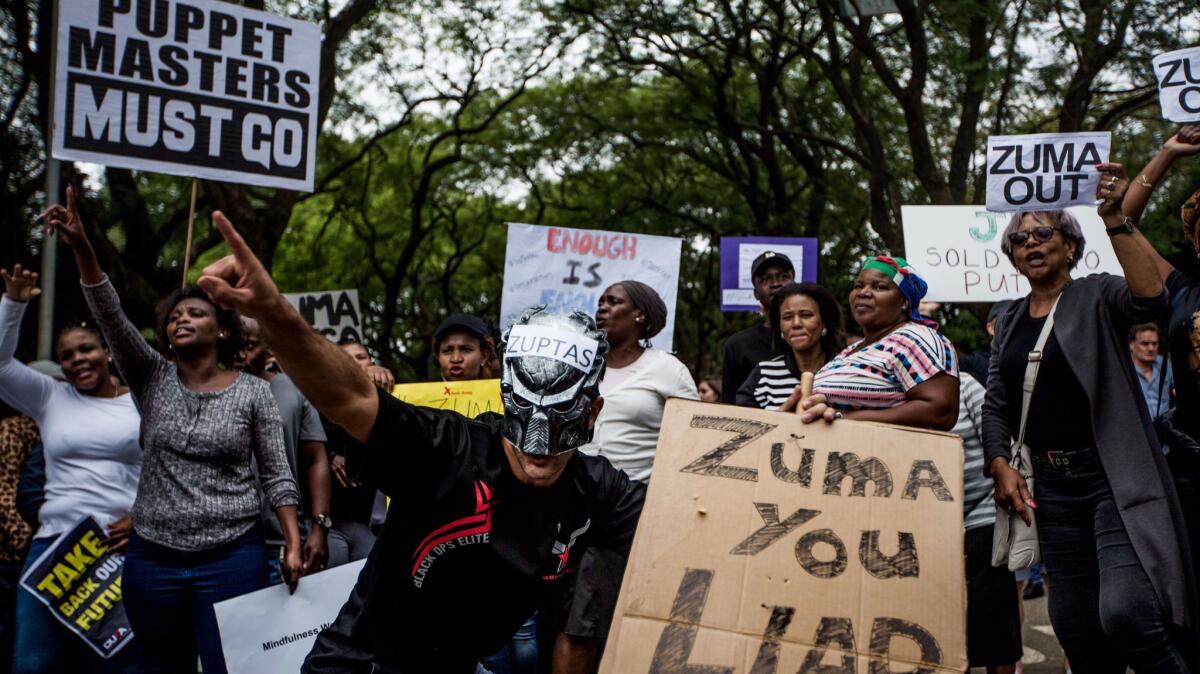
The protests came after international ratings agency Standard & Poor’s on Monday downgraded the country’s credit rating on its foreign denominated debt to junk status — or sub-investment grade, causing the currency, the rand, to plummet.
A second international ratings agency, Fitch, also downgraded South Africa’s credit rating to junk status — on both debt held in foreign and local currency — a more damaging development. A third agency, Moody’s, has put South Africa on negative review, meaning a downgrade is under consideration.
The protests were led by the opposition and civic action groups including Save South Africa. Critics said middle-class white South Africans who joined the protests did so only because their comfortable lifestyles could be affected by the ratings downgrade.
“Imagine what could have been if we white South Africans were as outraged at apartheid, torture & death squads as we are at Zuma right now,” tweeted columnist Max Du Preez on Monday.
Marius Oosthuizen, a University of Pretoria lecturer, wrote in a column on the news website Daily Maverick that to people in South African townships, the marches “look a little elitist and far too pale.”
“To my angry friends, we whites look like ignorant brats fighting over our many toys.”
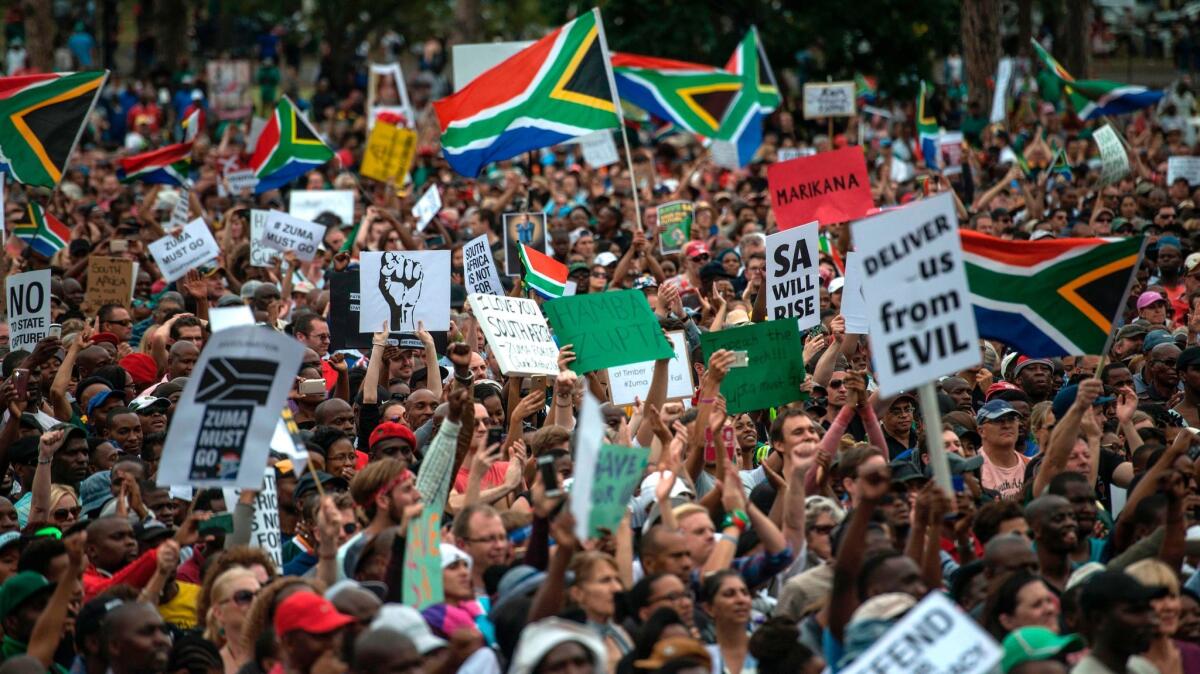
For South Africa’s middle classes, the fall in the rand’s value may make their next overseas vacation costlier. But for impoverished black South Africans, the rising cost of food staples and transportation will bite hard.
Samuel Masemola, 44, an unemployed man from Temba, a township about 30 miles north of Pretoria, struggles to feed his six children, yet he did not hesitate to vote ANC at the last election in 2014.
“Before the election they come to us in our place and they lied to us. They said, ‘We are going to make everything different,’ you see. I’ve been thinking that party was going to make good things for us. The ANC promised us too many things. They promised they would give us houses and jobs. I thought they’d change everything.”
Masemola had not heard about the ratings downgrade, nor did he mention Zuma’s sacking of Gordhan. He came to protest because the ANC had not improved his life.
“The president must go,” he said, adding that he wanted to join the main opposition party, the Democratic Alliance, although it is widely perceived as a “white” party. He claimed the ANC has been losing support in his neighborhood.
“Of 100 people, 70 hate this party,” he said. “Thirty, they like it. Seventy, they don’t want it.”
The alliance has had a black leader, Mmusi Maimane, since 2015, but before that its leaders were white and many of its shadow ministers are white.
Thembinkosi Nhlapo, 32, from Soweto, is jobless and sleeps in a local park, with several dozen other people. He earns money for food by hawking clothes from house to house. He graduated from high school and got a certificate in computer studies from a private institution, but never found work.
He admires the ANC’s name and former presidents such as Mandela and Thabo Mbeki, but does not like Zuma and other leaders. In the future he is contemplating voting for a radical opposition party, the Economic Freedom Fighters.
“Mandela was a great, great leader, even more than Mbeki.
“The rulers, the leaders are destroying the ANC. People, they may act good as they want to be voted for, but after you vote for them, it’s empty promises. They come with promises they can’t fill.”
Nhlapo said food prices are already rising sharply.
“Prices have gone up like crazy. It’s too much. I used to buy groceries in four plastics for 500 rands,” he said, referring to plastic shopping bags, “but now it’s only three plastics.”
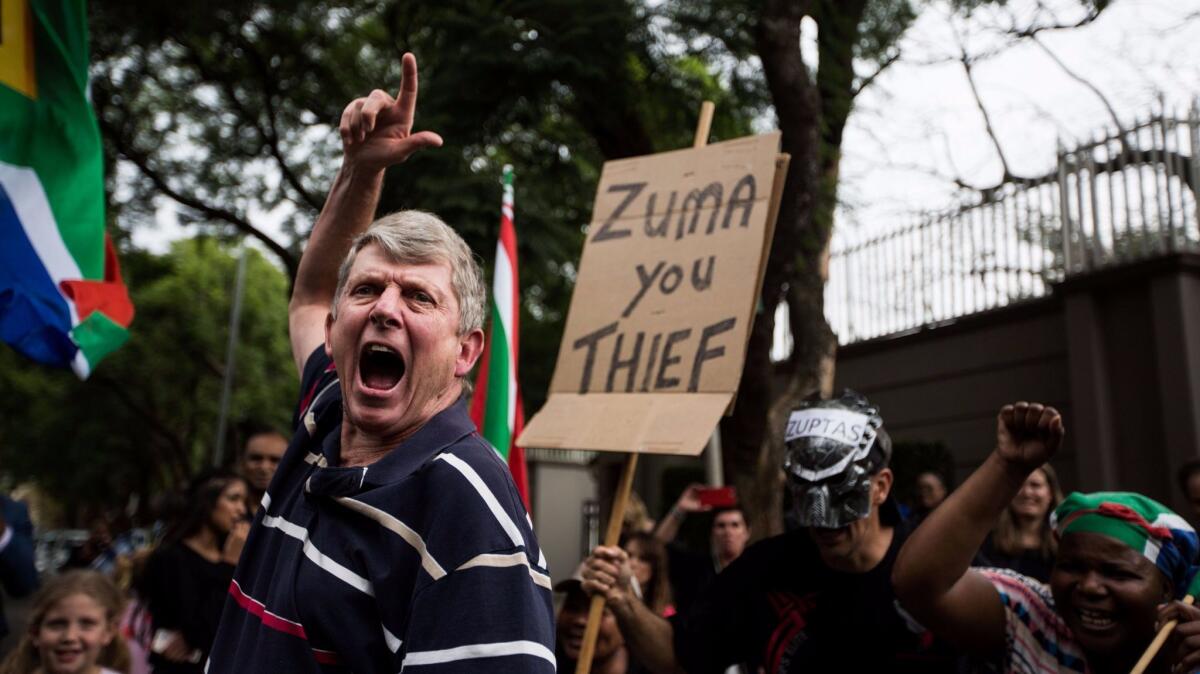
Demonstrators performed the toyi-toyi, a black South African struggle dance displayed in protest marches since the days of apartheid, but few whites were to be seen in the throngs of singing, stamping, weaving dancers. They stood holding up signs or sat on the grass.
“If we get lost, we’ll meet at the Sheraton Hotel,” said one white protester, speaking on his cellphone, referring to a nearby upscale hotel.
Marina Ehlers, 45, a Pretoria businesswoman who employs 20 people making mosaics, said she had never been to a protest march before.
“I’m not generally a political person, but when you see everything going wrong, you realize you have to protest.
“The government has no integrity. It’s not just Jacob Zuma. It’s the whole system that is keeping him in place. It’s the poor people who suffer most. It’s bad for the economy. Eventually we are all going to become poor.”
Her husband, Gavin Ehlers, 46, a software engineer and Democratic Alliance voter, said that the party needed to become more representative of black South Africans.
“If the ANC is able to deal seriously with Zuma and what he represents in terms of corruption, it would alter my picture of what the ANC is but up to now I’ve been disappointed with the way they’ve dealt with glaring corruption and incompetence.”
But he said Friday’s mass protest encouraged him.
“When I see movements like this, when I see people rising up, it gives me hope,” he said.
“I think South Africa does have the capacity to pull itself out of this hole,” he said. “I think it’s got to start with the ANC reforming itself.”
in an interview with the website BizNews, London-based financial analyst Peter Attard Montalto, who specializes in African economies including South Africa, predicted that the march would be futile. He said ANC’s National Working Committee has protected Zuma, meaning he was unlikely to be removed.
“I think that the resistance is largely irrelevant and I think that it is ultimately because the president doesn’t care,” he said, revising his prediction for South African growth for this year from 1.1% to 0.2%, and forecasting the rand would drop from about 13.7 to the dollar to about 15.5 to the dollar.
Twitter: @RobynDixon_LAT
More to Read
Sign up for Essential California
The most important California stories and recommendations in your inbox every morning.
You may occasionally receive promotional content from the Los Angeles Times.

